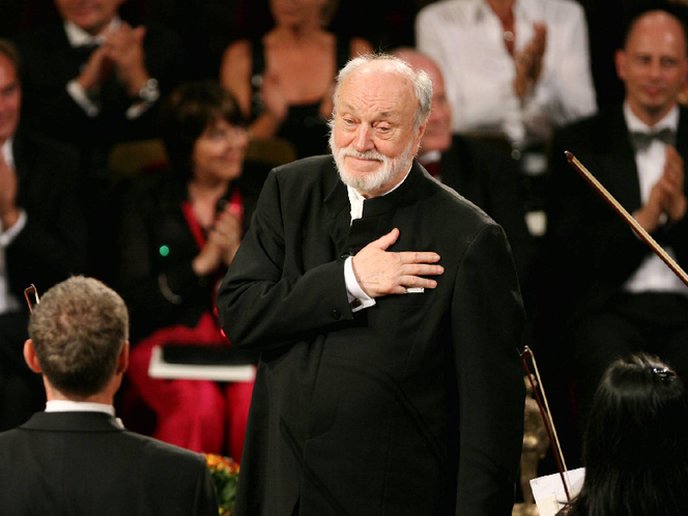Kurt Masur and Mendelssohn House
The Kurt Masur Institute has been keeping the memory of Kurt Masur and his life's work alive since 2016. It serves as a place of interaction and education as the humanist and cosmopolitan maestro would have wished and aims to open up new cultural perspectives to people worldwide, especially children and young people, “by the power of music”. The institute is part of the Felix-Mendelssohn-Bartholdy-Stiftung foundation in Mendelssohn House in Leipzig.
International Kurt Masur Institute
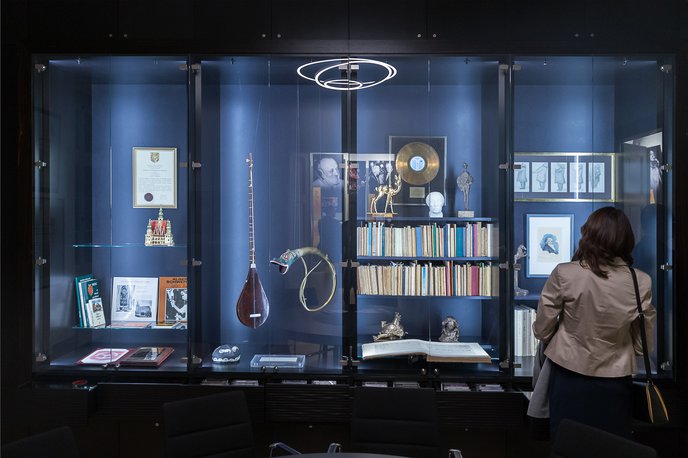
-
Activities and projects
“The message I wanted to bring to people has been the same since the beginning of my life: understanding, friendliness, humanism.”
Kurt MasurMany people experienced support, edification and encouragement as well as food for thought through Kurt Masur's courageous conduct, his passionate words and his musical interpretations. The institute develops various event formats from this intellectual heritage. The establishment of a digital Kurt Masur Archives, symposia on topics from music and society, special exhibitions, further education projects for young conductors, the awarding of the Kurt Masur Prize, and the international exchange of young musicians are the cornerstones of its work.
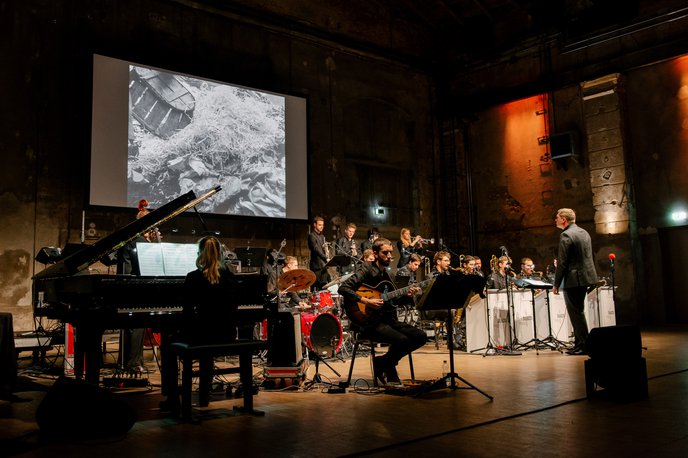
The German Bundesjazzorchester youth jazz orchestra performed at the Kunstkraftwerk Leipzig in 2019 at the invitation of the Kurt Masur Institute. © Kunstkraftwerk/Luca Migliore © Kunstkraftwerk/Luca Migliore 2022
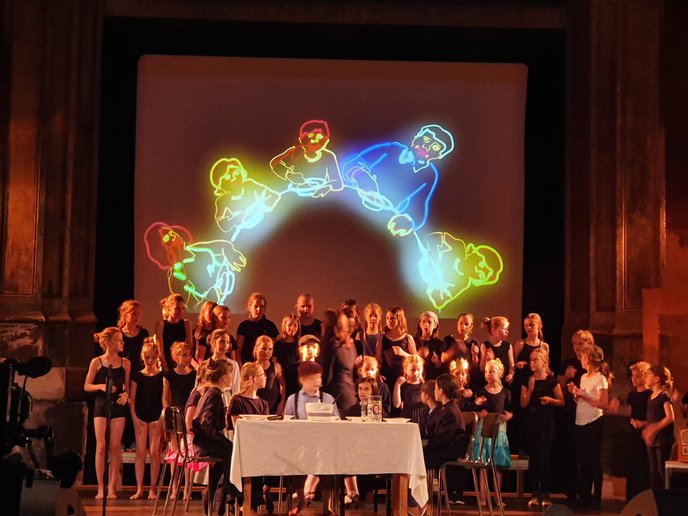
Das Kurt-Masur-Musical - Eine Aufführung und Kooperation mit der Kurt-Masur-Schule © Mendelssohn-Haus Leipzig Musikalisch und multimedial unterstützt durch Originalaufnahmen führte vom 21. bis 23. Juni die Musiktheater-Gruppe der Kurt-Masur-Schule das „Kurt Masur Musical“ auf und ging damit auf eine Zeitreise in die Jugendjahre Kurt Masurs. Erzählt wurde eine Geschichte von einer scheinbar behüteten Kindheit, von Krieg, Gefangenschaft und Flucht, von Hoffnung und Neubeginn. Die Texte und die Musik entstanden in Kooperation von Kurt-Masur-Institut und Hochschule für Musik und Theater Leipzig „Felix Mendelssohn-Bartholdy“.
Unter dem Titel „Wird denken an Kurt Masur“ widmeten die Stiftung und das Institut am 17. Juli und am 18. Dezember Konzerte zum Geburtstag und Todestag. Das Konzert am 18. Dezember gestalteten junge Musiker der Kurt-Masur-Akademie der Dresdner Philharmonie, damit konnte eine langjährige Zusammenarbeit fortgesetzt werden.
Anlässlich der der Veröffentlichung einer 70-CD umfassenden CD-Box zum Oeuvre von Kurt Masur durch Warner Classics spielte Elisabeth Leonskaja am 22. April 2022, enge musikalische Wegbegleiterin des Maestros für fast 40 Jahre, im Musiksalon des Mendelssohn-Hauses Leipzig Klaviersonaten von Ludwig van Beethoven. Die Neu-Edition umfasst Aufnahmen die Jahre von 1974 bis 2009 entstanden sind und zeichnet ein einzigartiges Bild des Lebenswerks Masurs. Sie entstand in enger Zusammenarbeit mit dem Institut.
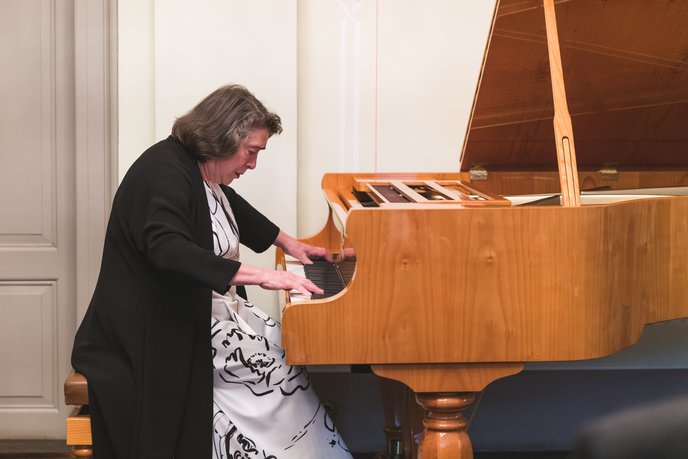
Elisabeth Leonskaja spielte am 22. April zu Ehren Kurt Masurs im historischen Musiksalon. © Christian Kern 2021
Kurt Masur in Israel - music transcends borders
In cooperation with the Jewish Week Leipzig, the results of the research were presented on 2 July 2021 in the Alte Börse (Old Stock Exchange) Leipzig in a lecture by Friedhelm Eberle with music before and after by Ruth Ingeborg Ohlmann (soprano), accompanied by Karl-Heinz Müller (piano), with works by Adolph Kurt Böhm (honoured in Yad Vashem as Righteous Among the Nations). The original plan was for Yael Ben-Moshe to personally present the results to the interested audience, however, this was not possible due to the Covid regulations in Israel and Germany. Furthermore, due to the restrictions, only a small audience was able to attend the event. The lecture can be viewed on YouTube.
Kurt Masur in Japan - a pioneer
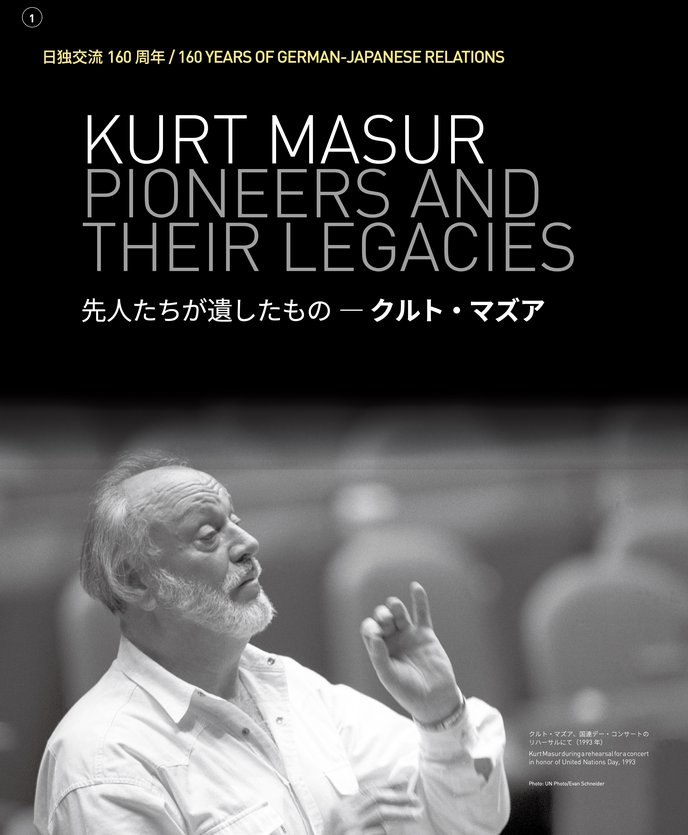
Japan and Germany celebrated “160 Years of Friendship”. A look at the eventful history of the two countries shows that relations have always been strongly influenced by pioneering trailblazers. One such pioneer was Kurt Masur. The German embassy in Tokyo dedicated an exhibition and a concert to the conductor and cosmopolitan in cooperation with the Kurt Masur Institute. A memorial concert was held in his honour at Muza Kawasaki Hall on 14 December 2021. The Orchestra Infinitude, assembled especially for the event, was led by Singaporean conductor Kahchun Wong, a former student of Kurt Masur. More information can be found here.
Cooperation with the German Conductors' Forum
For the second time, the German Music Council, in cooperation with the Kurt Masur Institute and other partners such as the Cologne Philharmonic, the Gürzenich Orchestra Cologne and the WDR Symphony Orchestra, has awarded the German Conductor Prize. The Institute donated the Audience Award this year, which was presented to Hangyul Chung.
In this way, the Institute would like to support the initiative of the German Music Council and contribute to the promotion of young talent. True to the motto of the Institute “Music - Encounter - Inspiration”, this award is to encourage young conductors and inspire them to continue on the path they have chosen.
Tomoko Masur states in this regard, “For my husband, Kurt Masur, but also for the Institute and myself, the promotion and support of musical diversity, especially up-and-coming musicians and conductors, is a central topic. Between 1994 and 2010, he was artistic director of the German Conductors' Forum seven times, where the German Conductors' Prize was first awarded in 1995 - at that time only in Germany. So it fills me with pride and joy that my husband's commitment will continue and be honoured after his death.”
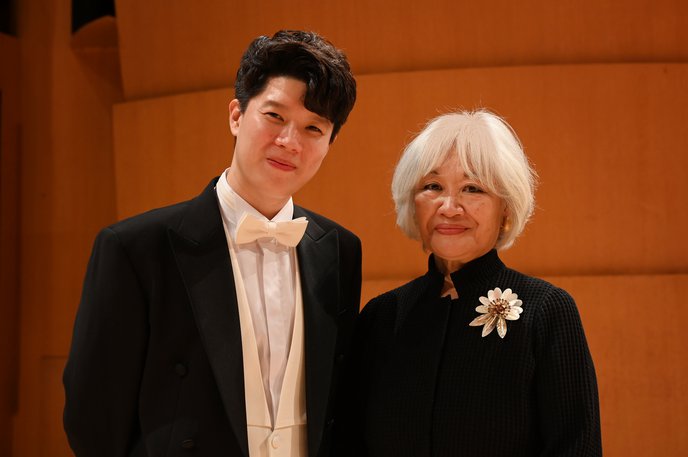
Hangyul Chung und Tomoko Masur © Deutscher Musikrat – Hyou Vielz In cooperation with the Jewish Week Leipzig, the results of the research were presented on 2 July 2021 in the Alte Börse (Old Stock Exchange) Leipzig in a lecture by Friedhelm Eberle with music before and after by Ruth Ingeborg Ohlmann (soprano), accompanied by Karl-Heinz Müller (piano), with works by Adolph Kurt Böhm (honoured in Yad Vashem as Righteous Among the Nations). The original plan was for Yael Ben-Moshe to personally present the results to the interested audience, however, this was not possible due to the Covid regulations in Israel and Germany. Furthermore, due to the restrictions, only a small audience was able to attend the event. The lecture can be viewed on YouTube.
-
Kurt Masur Centennial 2027
2027 feiern wir den 100. Geburtstag von Kurt Masur. Gemeinsam mit Partnern aus aller Welt planen wir dazu ein Festjahr mit Konzerten, Masterclasses, Symposien, Ausstellungen und Vermittlungsprojekten, um die vitalisierende Botschaft von Kurt Masur in die Zukunft zu tragen. Dabei unterstützt uns die von Tomoko Masur initiierte Kurt Masur Centennial GmbH mit deren Geschäftsführer Herrn Prof. Michael Kaufmann und Arabella Arts in New York.
Die mehrteilige biographische Comic-Reihe „Durch die Kraft der Musik“ zum Leben und Wirken Kurt Masurs führt mit dem ersten Band „Kurt & Das Neue Gewandhaus“ ab dem Frühjahr 2024 als bedeutender Baustein auf das Kurt Masur Centennial 2027 hin. Der Comic lädt Leserinnen und Leser jeden Alters dazu ein, sich von Kurt Masur inspirieren zu lassen.
Ein Projekt der Kurt Masur Centennial GmbH in Kooperation mit dem Internationalen Kurt Masur Institut
Mit freundlicher Unterstützung der Sparkasse Leipzig
-
Children and young people
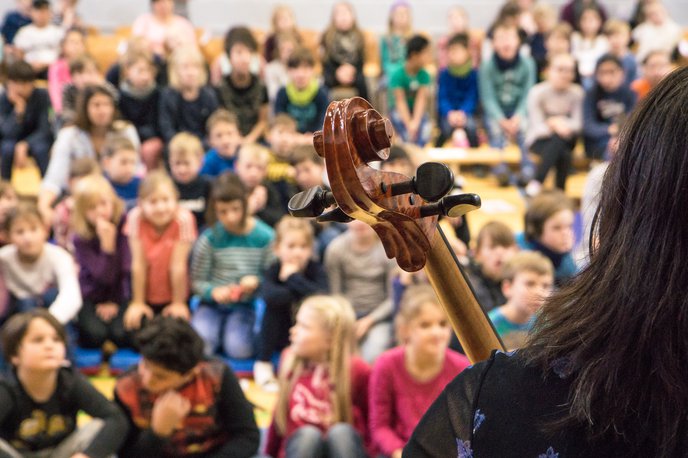
Musical education in the Kurt Masur school. © Christian Kern © Christian Kern “Passing on the secret of music to young people is our greatest task at the moment. Music can trigger associations in people - if they have learned to understand it - and give rise to new fantasies.”
Kurt MasurA central task of the Institute is to enable future generations to use their (musical) voice with respect for others and to help shape social dialogue. In cooperation with several primary and secondary schools, children and young people are repeatedly given the opportunity to creatively engage with Kurt Masur and the music of, for example, Ludwig van Beethoven. The beginning of the final movement of the 9th Symphony “Oh friends, not these sounds, but let us strike up more pleasing ones” is synonymous with the fact that there cannot be a state of peaceful coexistence without one's own participation in civil society. The interaction between musical and artistic activities and the development of one's own role in society becomes tangible.
-
Exhibitions and archives
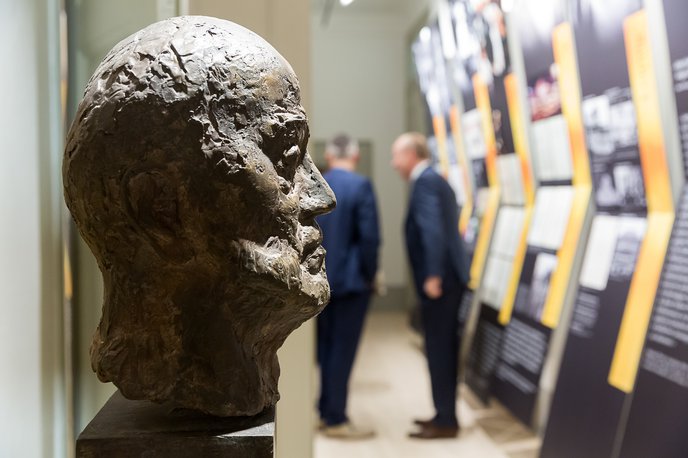
Inside the Kurt Masur Institute. © Christian Kern © Christian Kern Since the founding of the International Kurt Masur Institute, an extensive media exhibition on the conductor's life and work has been created in the rooms of Mendelssohn House Leipzig. At the same time, its extensive archives are a contact point for a wide variety of interested parties. Currently, large parts of the private archives are being successively indexed, digitised and thus made accessible to the public. Masur's estate includes tens of thousands of letters, documents, audio and film recordings as well as press articles and programmes from over 70 years of his work. There are also extensive collections of photos, sheet music / scores, posters and works of art, and an extensive music library.
Biografie
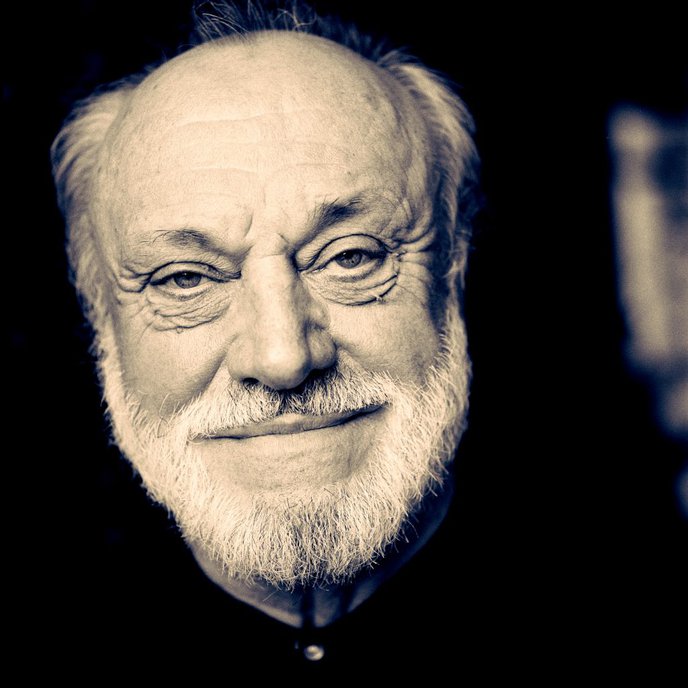
-
The conducter as a humanist and cosmopolitan
“I have always tried to use music to make people understand that there is something higher than the disputes of the day. What unites us all is actually documented in Beethoven's Ninth: Joy is to unite people, not hatred." Kurt Masur
As an exemplary personality, Kurt Masur, born in 1927, not only worked in Germany, but also as a mediator and cosmopolitan for cultural and democratic values until his death in December 2015. He became involved in socio-political discourses and used his prominence for the good of the community: This ranged from his commitment to saving Mendelssohn House to his forward-looking initiative for and realisation of the only new concert hall in the German Democratic Republic, the New Gewandhaus, to his involvement in the Peaceful Revolution.
Kurt Masur set standards in the development and interpretation of orchestral works and the promotion of young musicians. In addition to his commitment to musical tradition, his thinking and work were always characterised by curiosity and openness when transcending musical genres (e.g. his interest in jazz) and disciplines in the cultural sector (as art exhibitions in the Gewandhaus show).
Earlier stations in his musical work were the Stadttheater Halle theatre and the Dresden Philharmonic. He was musical director of the Gewandhaus in Leipzig from 1970 to 1996, musical director of the New York Philharmonic Orchestra from 1991 to 2002, and principal conductor of the London Philharmonic Orchestra from 2000 to 2007. From 2002 to 2008 he was also the musical director of the Orchestre National de France in Paris. In addition, he conducted orchestras all over the world and was, for example, honorary conductor of the Israel Philharmonic Orchestra.
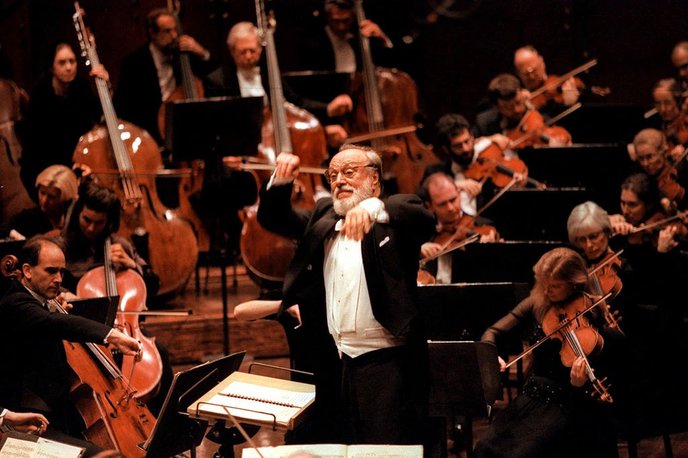
Kurt Masur dirigiert das New York Philharmonic Orchestra. © Chris Lee -
Leipzig, a stroke of luck
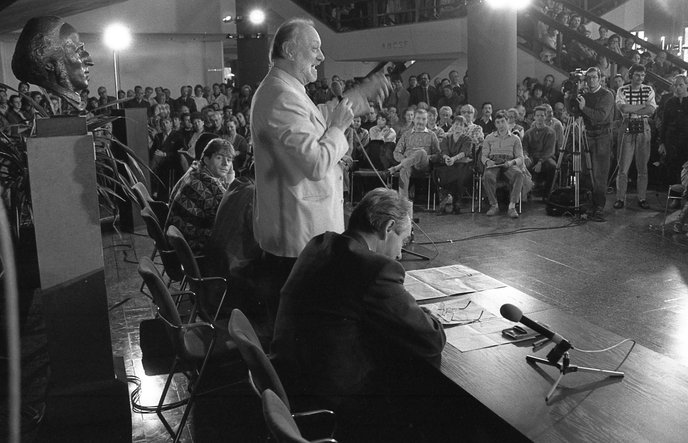
Kurt Masur opened the Gewandhaus to social dialogue in autumn 1989 and headed many events himself. © Gert Mothes © Gert Mothes “I will never forget the moment when I was able to observe how Kurt Masur, in his beautiful Gewandhaus in Leipzig, was torn between the call of the music of his Gewandhaus Orchestra, which came to him from the large concert hall, and the call of the people in front of the Gewandhaus, who asked for his guidance.”
Kurt Biedenkopf on the presentation of the German Citizenship Award to Kurt Masur 2011Kurt Masur shaped the city of music Leipzig and the Gewandhaus Orchestra like few others, and the city of Leipzig was also an absolute stroke of luck for Kurt Masur. He played more than 2000 concerts with the orchestra, ambitiously and passionately promoted and shaped the construction of a new Gewandhaus on Augustusplatz, opened the rooms for political debates, street musicians and jazz, exhibitions and much more. Many recordings and tours spread the new reputation of the Gewandhaus Orchestra throughout the world. Between 1971 and 1996, the Gewandhaus Orchestra with Kurt Masur made a total of ten guest appearances in the United States and seven in Japan, not to mention extensive concert tours to Southern, Eastern, Northern and Western Europe, South America and visits to the western part of Germany. In total, the orchestra visited 30 different countries on large tours lasting several weeks. And Kurt Masur also conducted operas in his homeland.
He was always ensuring the artistic continuity of the primarily German repertoire of classical, romantic and late romantic periods, without neglecting Slavic music or contemporary music. He honed the technical quality of the orchestra, and, through his slightly grumpy nature, grew into a father figure. This position and his irrepressible will to preserve the cultural diversity in Leipzig also helped him to preserve Mendelssohn House, and more importantly, together with others, he saved the people of Leipzig from further horrors on 9 October 1989.
-
Carrying Mendelssohn's spirit into the world
“When Mendelssohn once said that life and art are not two different things, I have always felt this unity very deeply and have striven to act accordingly.”
Kurt Masur in the prologue to his biography “Zeiten und Klänge” (“Times and Sounds”)Kurt Masur not only erected a monument to Felix Mendelssohn Bartholdy with his concert programmes, reference recordings and lectures, but also created a worthy, tangible centre for the legacy of the composer, conductor, cultural politician and European par excellence - Mendelssohn House in Leipzig. The opening of the museum on the occasion of the 150th anniversary of his death in 1997 was the first culmination of his tireless efforts to save Mendelssohn's home and the house where he died, the only remaining private address of the musician. “It is the richness of his music and the deep humanity of his works that speak to me so much,” Kurt Masur once said, explaining his commitment. Kurt Masur placed the composer, who was pushed to the fringes of the repertoire in the 19th century by anti-Semitic hostility and music-aesthetic prejudice, at the centre of his work. Again and again he showed the diversity of his music and recorded almost the complete works with the Gewandhaus Orchestra, including the early string symphonies, which had never been acknowledged before. In the more than 26 years that Kurt Masur was conductor of the Gewandhaus Orchestra, he gave more than 940 concerts outside of Leipzig. In addition to the compositions by Beethoven and Brahms, the works by Mendelssohn were most frequently on the programme, namely 220 times. Kurt Masur also regularly performed Mendelssohn's compositions with his orchestras in New York, London and Paris. Moreover, his performances of “Elijah” with the Israel Philharmonic Orchestra in Tel Aviv and around the world received special attention.
-
New York, Paris and London
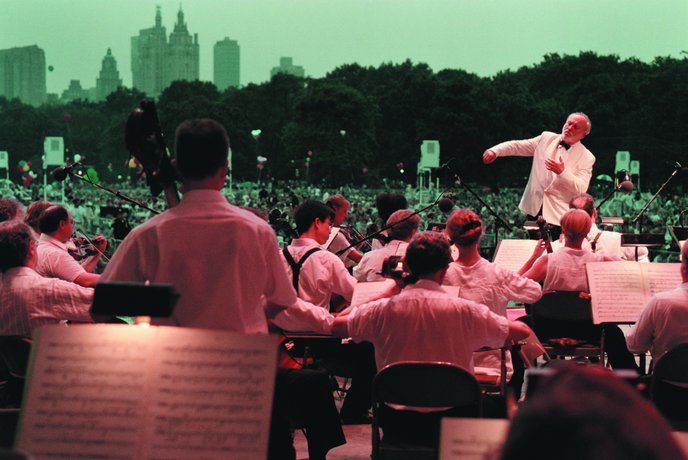
New York's Central Park becomes a stage. Kurt Masur conducted the New York Philharmonic Orchestra here in 1998. © Chris Lee © Chris Lee “From the beginning, I have said that the future must not appear grey; rather, the future is to expect even more of the audience – not only in terms of performances with high artistic standards, but also in terms of the willingness among the members of philharmonic orchestras to open themselves up to new musical influences and to discover the visions of young composers.”
Kurt Masur in an interview with Phillip Booth, 28 December 1999From the city of music Leipzig, Kurt Masur's musical path as principal conductor led to many other international orchestras such as the New York Philharmonic Orchestra (1991 to 2002), the London Philharmonic (2000 to 2007) and the Orchestre National France (2002 to 2008), and he was a welcome guest with many renowned orchestras around the world.
Kurt Masur's time with the New York Philharmonic was marked by many extraordinary events. They ranged from sumptuous, top-class gala concerts to very casual public concerts in Central Park. In 1992, the orchestra celebrated its 150th anniversary in grand style. At the first Memorial Day Concert, initiated by Kurt Masur, in the Cathedral of St. John the Divine, hundreds of people lined up for the concert many hours before the start. The Memorial Day Concert, which is free to the public, is a tradition and continues to this day as one of the most popular events in New York City. The planned season opening concert in September 2001 became a benefit performance for the firefighters. Johannes Brahms' “A German Requiem” with its moving chorale “Blessed are they that mourn; for they shall be comforted” was a musical commemoration of the victims of the attack of 11 September 2001. This concert is deeply etched in the city's collective memory and is still broadcast annually on 11 September.
In 2000, Kurt Masur was called to Europe. In the same year, he became principal conductor of the London Philharmonic Orchestra, and from 2002, also musical director of the Orchestre National de France. Kurt Masur has recorded a number of important CDs with both orchestras. In July 2007, Kurt Masur celebrated his 80th birthday with an impressive concert at the BBC Proms in London, where he united the musicians of the London Philharmonic and the Orchestre National de France and conducted them together. The Royal Albert Hall was filled with 6000 enthusiastic listeners.
